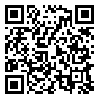Fri, Apr 26, 2024
[Archive]
Volume 2, Issue 1 (1-2010)
IJDO 2010, 2(1): 27-31 |
Back to browse issues page
Download citation:
BibTeX | RIS | EndNote | Medlars | ProCite | Reference Manager | RefWorks
Send citation to:



BibTeX | RIS | EndNote | Medlars | ProCite | Reference Manager | RefWorks
Send citation to:
Fatehi F, Malekzadeh G, Akhavimirab A, Rashidi M, Afkhami-Ardekani M. The Effect of Short Message Service on Knowledge of Patients with Diabetes in Yazd, Iran. IJDO 2010; 2 (1) :27-31
URL: http://ijdo.ssu.ac.ir/article-1-23-en.html
URL: http://ijdo.ssu.ac.ir/article-1-23-en.html
Farhad Fatehi * 
 , Golnaz Malekzadeh
, Golnaz Malekzadeh 
 , Atefeh Akhavimirab
, Atefeh Akhavimirab 
 , Maryam Rashidi
, Maryam Rashidi 
 , Mohammad Afkhami-Ardekani
, Mohammad Afkhami-Ardekani 


 , Golnaz Malekzadeh
, Golnaz Malekzadeh 
 , Atefeh Akhavimirab
, Atefeh Akhavimirab 
 , Maryam Rashidi
, Maryam Rashidi 
 , Mohammad Afkhami-Ardekani
, Mohammad Afkhami-Ardekani 

Abstract: (18687 Views)
OBJECTIVE: Diabetes mellitus has shown a tremendous health and social burden worldwide. Better glycemic control in patients with diabetes can be achieved by improving their knowledge which consequently will prevent developing microvascular and neurological complications. Some studies demonstrate effectiveness of Short Message Service (SMS) for patient education. Regarding exponential growth in mobile phone penetration and its text messaging service in Iran, we decided to evaluate effectiveness of sending SMS in improving knowledge of patients with type 2 diabetes in Yazd, Iran.
MATERIALS AND METHODS: In this randomized controlled trial, 100 patients with diabetes were randomly allocated into Intervention Group or Control Group. Short messages were sent to the mobile phones of intervention group every other day using an Internet-based messaging system for 45 days. The control group just received the invitation messages for taking part in the study and a free physician visit. Knowledge of patients was assessed using a questionnaire with 20 multiple choice questions.
RESULTS: Eighty one patients (43 intervention group, 38 control group) concluded the study. Mean of correct answers in intervention group improved significantly (P < 0.001) from 7.92 to 11.51 after 45 days, while this difference was not significant in control group. Mean of incorrect answers decreased from 8.00 to 7.00 in intervention group, but it increased from 8.90 to 9.45 in control group. The change of mean score, before and after the intervention, was significantly different between the two groups (P < 0.001).
CONCLUSION: SMS is an effective means of conveying information to the patients with diabetes who own a mobile phone. Further studies are suggested to check whether this improvement in knowledge will lead to change in their attitude and/or practice.
| Rights and permissions | |
 |
This work is licensed under a Creative Commons Attribution-NonCommercial 4.0 International License. |



